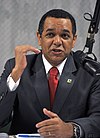Ministry of Racial Equality (Brazil)
This article needs additional or more specific categories. (January 2023) |
| Portuguese: Ministério da Igualdade Racial | |
 | |
| Agency overview | |
|---|---|
| Formed | 21 March 2003 |
| Type | Ministry |
| Jurisdiction | Federal government of Brazil |
| Headquarters | Esplanada dos Ministérios, Bloco F Brasília, Federal District |
| Annual budget | $91.8 m BRL (2023)[1] |
| Agency executives |
|
| Website | www |
Ministry of Racial Equality (Portuguese: Ministério da Igualdade Racial) of Brazil is a department of the direct public administration of the Federal Government responsible to plan, coordinate and execute public politics of promotion of racial equality and fight against racism on a national level. The incumbent minister of state who heads the ministry is Anielle Franco.[2][3]
History
[edit]It was created under the name of Special Secretariat of Politics of Promotion of Racial Equality of the Presidency of the Republic (SEPPIR), on 21 March 2003, during the government of Luiz Inácio Lula da Silva, as a secretariat linked to the Presidency and with cabinet-level recognition as a Minister of Racial Equality. The first chief minister was Matilde Ribeiro, social worker and university professor. In 2015, the position was folded by Dilma Rousseff under the Ministry of Women, Racial Equality and Human Rights, but the creation of the unified ministry was not approved by Congress. The unified ministry was dissolved and reactivated under the presidencies of Michel Temer and Jair Bolsonaro from 2015 to 2023. With the appointment of Anielle Franco by Lula da Silva, the mission of the Special Secretariat was revived as a separate Ministry of Racial Equality.
List of ministers
[edit]Parties
[edit]| No. | Portrait | Minister | Took office | Left office | Time in office | Party | President | |
|---|---|---|---|---|---|---|---|---|
| 1 | Matilde Ribeiro (born 1960) | 21 March 2003 | 6 February 2008 | 4 years, 322 days | PT | Luiz Inácio Lula da Silva (PT) | ||
| 2 | Edson Santos (born 1954) | 20 February 2008 | 31 March 2010 | 2 years, 39 days | PT | Luiz Inácio Lula da Silva (PT) | ||
| 3 | Eloi Ferreira (born 1959) | 31 March 2010 | 1 January 2011 | 276 days | PT | Luiz Inácio Lula da Silva (PT) | ||
| 4 | Luiza Bairros (1953–2016) | 1 January 2011 | 1 January 2015 | 4 years, 0 days | Independent | Dilma Rousseff (PT) | ||
| 5 | Nilma Lino Gomes (born 1961) | 1 January 2015 | 2 October 2015 | 274 days | Independent | Dilma Rousseff (PT) | ||
| 6 | Anielle Franco (born 1984) | 1 January 2023 | Incumbent | 2 years, 18 days | PT | Luiz Inácio Lula da Silva (PT) | ||
Organizational structure
[edit]
Due to the long period it was a child agency in another department, the Ministry of Racial Equality is under a process of redeployment and should follow the organizational structure of the other Brazilian ministries that are composed by the following units and organs:
- Direct and immediate assistance organs: Minister Cabinet; Executive Secretariat; Special Advisory of Internal Control (AECI); Juridical Consultancy (CONJUR).
- Singular specific organs: thematic secretariats that are part of the second-tier of the federal government (these are subdivided in specialized department that form the third-tier):
- Secretariat for Affirmative Action Policies, Combating and Overcoming Racism (SEPAR)
- Directorate of Affirmative Action Policies
- Directorate of Policies to Combat and Overcome Racism
- Secretariat of Policies for Quilombolas, Traditional Peoples and Communities of African Origin, Terreiro Peoples and Gypsies (SQPT)
- Directorate of Policies for Traditional Peoples and Communities of African Origin and Terreiros (DPMAT)
- Directorate of Policies for Quilombolas and Gypsies
- Management Secretariat of the National System for the Promotion of Racial Equality
- National System for the Promotion of Racial Equality (SINAPIR)
- Interfederative Coordination Board;
- Directorate of Evaluation, Monitoring and Information Management
- Secretariat for Affirmative Action Policies, Combating and Overcoming Racism (SEPAR)
Collegiate bodies
[edit]It has had or has the following administrative boards with consultative, deliberative and normative functions under its responsibility:
- National Council for the Promotion of Racial Equality (CNPIR)
See also
[edit]References
[edit]- ^ "Portaria do MPO adapta orçamento para 2023". Ministério do Planejamento e Orçamento (in Brazilian Portuguese). 16 February 2023. Retrieved 31 May 2023.
- ^ "Decreto de 1° de janeiro de 2023". Imprensa Nacional (in Portuguese). 1 January 2023. Retrieved 5 January 2023.
- ^ "Quem é quem: os 37 ministros empossados por Lula". G1 (in Portuguese). 1 January 2023. Retrieved 5 January 2023.
External links
[edit]- Official website (in Portuguese)






